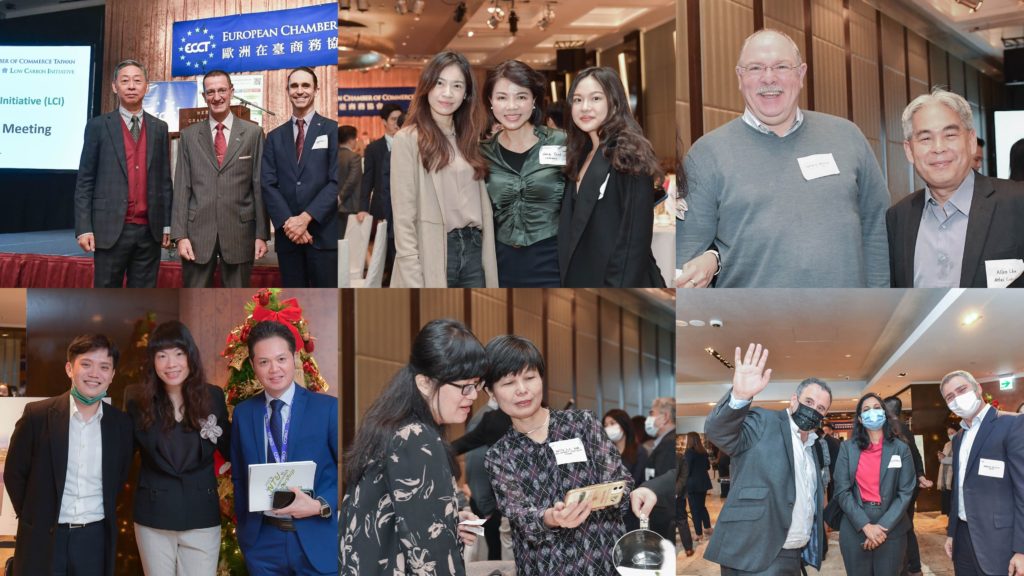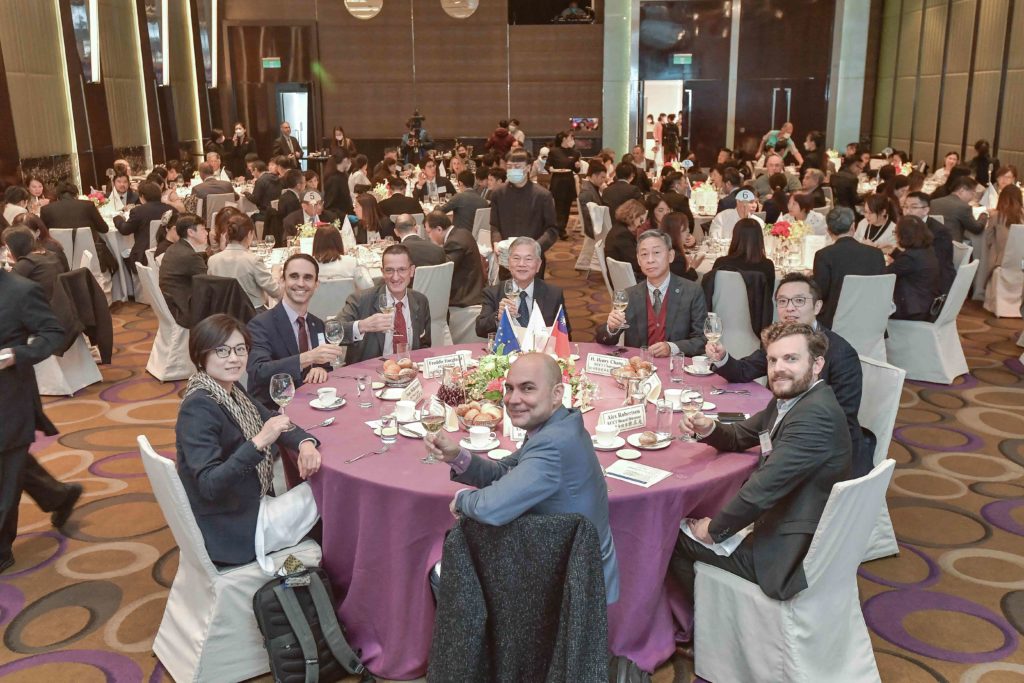[Event Report] LCI 2022 Annual Meeting & RE100 x ECCT LCI Taiwan RE Market Briefing Report Launch 2022 LCI 會員大會暨台灣再生能源市場報告書發表
- Press Release
- Photo Gallery: Facebook
- Download Report: https://reurl.cc/x1WWe1
- LCI 2022 Event Review Video
On 7 Dec. the ECCT Low Carbon Initiative (LCI) held its 2022 Annual Meeting to elect the 2023 new Steering Committee, introduce 30 new members of 2022, and present 2023 roadmap.
Over 80 LCI members participated the LCI Annual Meeting. The elected LCI Steering Committee of 2023 are: Mr. Giuseppe Izzo, MD Taiwan & VP, APAC Region STM, Mr. Eric Yu, General Manager & Global VP of Signify Taiwan, Ms. Jennifer Wang, Managing Director of TUV Rheinland Taiwan, Mr. Sean McDermott, Managing Director, Northland Power Inc., Mr. H. Henry Chang, Special Senior Consultant of Baker & McKenzie, and two ex officio the ECCT CEO Freddie Hoeglund and ECCT LCI Director Sammy Su.
-
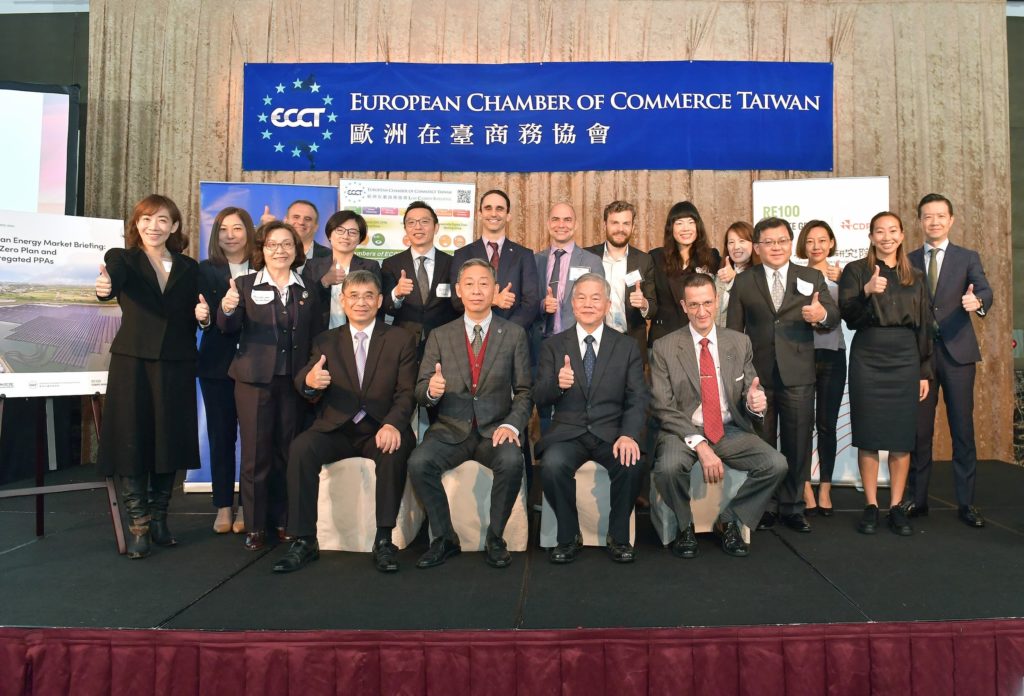
The LCI welcomes 9 new members in 2022 Q3-Q4




2022 Event Review & 2023 Roadmap Introduction by Sammy Su, Director of the ECCT LCI

-
After the LCI annual meeting, over 160 participants attended the launch of 2022 Taiwan Energy Market Briefing 台灣綠電交易報告 published by the #RE100 and the ECCT's Low Carbon Initiative (#LCI), revealing barriers and Aggregated PPAs” at a Premium Event lunch. At the event, a copy of the report was handed over to Vice Premier Shen Jong-chin (行政院副院長 沈榮津), keynoted Taiwan’s government endeavors of helping business run on 100% renewable energy. Opening remarks were made by ECCT Chairman Henry Chang and Ollie Wilson, RE100 Senior Campaign Manager at the Climate Group, after which Alisha Lee, RE100 Taiwan Representative, presented an update of the current status of the renewable energy market in Taiwan and summarised some of the challenges and opportunities that lie ahead.
-
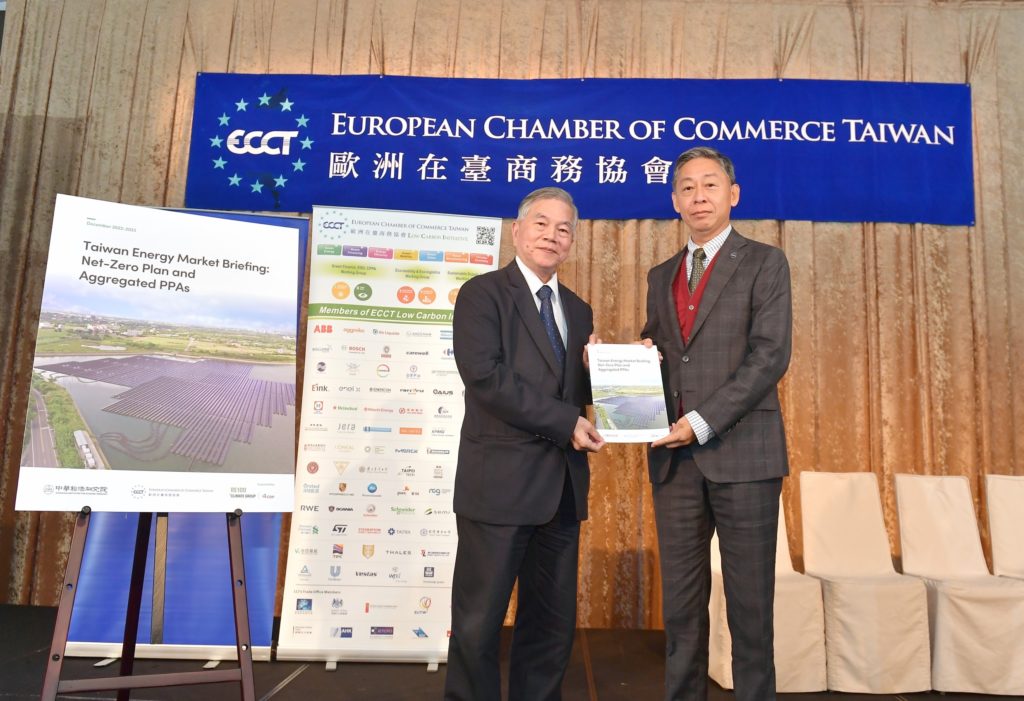
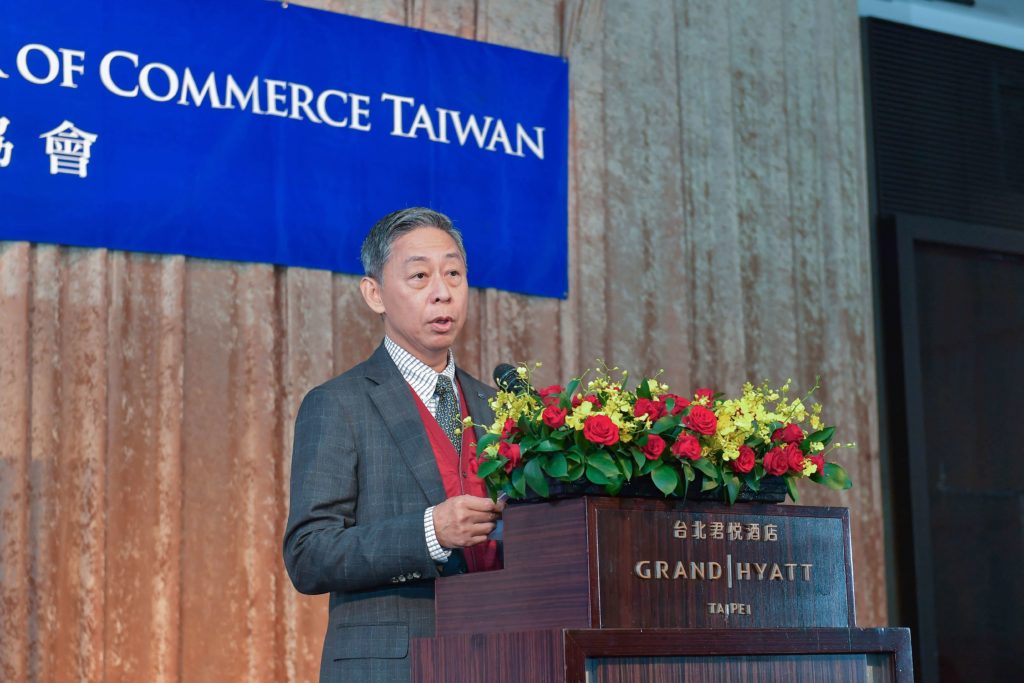
H. Henry Chang, ECCT Chairman 歐洲商會理事長 張瀚書
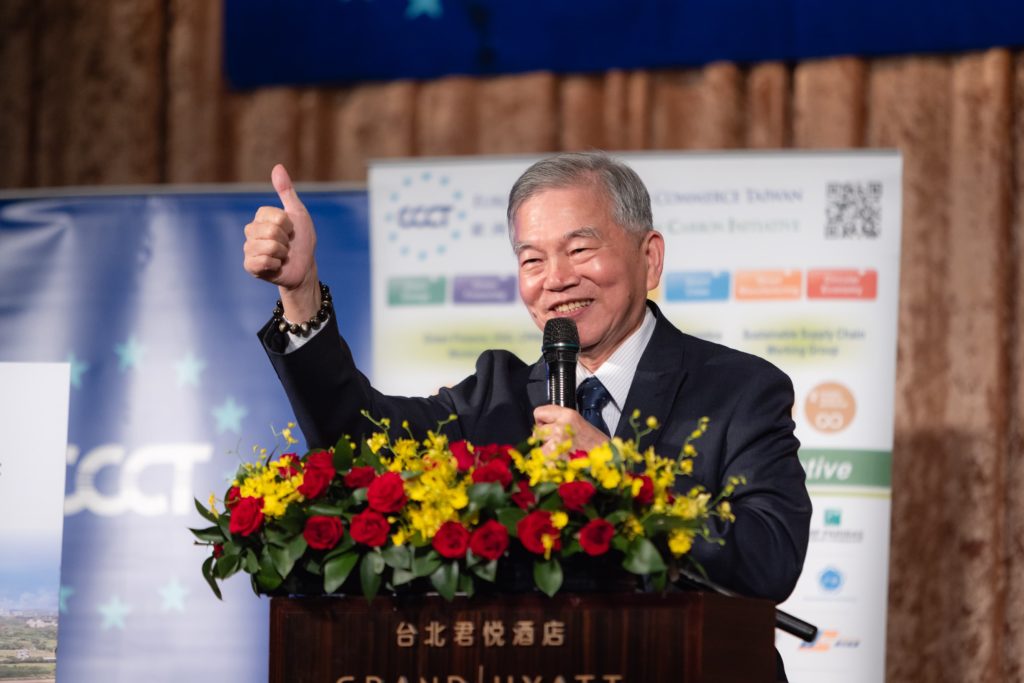
Shen Jong-Chin, Vice Premier of Executive Yuan 行政院副院長 沈榮津
-
Compiled by RE100 with the help of The Climate Group’s local campaign partner, the Chung-Hua Institution for Economic Research (CIER), and the LCI, the report analyses the Taiwan’s government policies, the renewable energy market, the options to purchase green power as well as the main obstacles to green power procurement in Taiwan.
The report notes that, compared to two years ago when the key barriers to RE in Taiwan were identified as high cost, low supply, and lack of market transparency, things have improved. However, demand for RE has grown as RE100 members are continuing to make progress on their targets, more Taiwanese companies are committing to using RE, and large electricity consumers are being pushed to source RE through legislation.
According to Ollie Wilson, RE100 now has 390 members of which 22 are Taiwanese, while over 100 of RE100 member companies have operations in Taiwan, for which they need to source clean energy. According to Alisha Lee, while only a few multinational companies operating in Taiwan have local manufacturing operations and do not therefore need to source a lot of power locally, nevertheless, Taiwan is cited as one of top 10 most challenging markets to source green energy.
According to statistics cited in the report, Taiwan’s electricity provider (Taiwan Power Company, or Taipower), the total renewable energy generated by the end of 2021 was 17,428,320 MWh with a capacity of 11,585 MW. When comparing this to Taiwan’s total electricity generated in 2021, renewables accounted for 6.3%, a slight increase from 5.8% in 2020. While the government has ambitious targets to get 60-70% of electricity from renewables and ramp up solar energy capacity to 40-80GW and wind energy capacity to 40-55GW by 2050, RE100 members are concerned about the speed of development given that Taiwan is already behind schedule in meetings its interim goals and many of them have pledged to reach net zero much sooner than 2050.
-

-
Despite high RE electricity prices, demand for RE is growing, as shown by RE100 members. An increase in demand is also in part due to the 2021 regulation that Taiwan’s largest 300 electricity consumers (those with contract capacities over 5,000 kW) must source 10% of their electricity from renewable energy sources within five years. This will add approximately 1GW in RE demand. For small and medium-sized enterprises (SMEs), the cost differences of non-renewable and renewable electricity are even greater given that they have less negotiating power for more affordable RE prices than large consumers do.
The need to meet localisation requirements is cited as one of the major reasons for high costs. In addition, developers have concerns over auction rules, one of the recent ones being a maximum capacity for individual wind farms of 600MW.
Results from the 2020 Taiwan Market Briefing and the latest RE100 survey stated that the top two reasons for the lack of corporately sourced RE were high costs and low supply. Bundled Taiwan Renewable Energy Certificates (T-RECs), which account for 1 MWh of electricity, are expensive. Meanwhile, corporate PPAs (CPPAs) are also priced very high in addition to requiring that buyers are large electricity consumers and can sign 10-20-year contracts. In other words, purchasing T-RECs in bulk is not economically feasible, and PPAs are only offered to very few companies who meet the current requirements, which most RE100 members with operations in Taiwan do not meet.
-

-
One possible solution to the barriers of CPPAs for companies is an aggregated PPA (APPA). An APPA enables two or more companies to combine forces in negotiating and buying a PPA, which benefits both the developers and purchasers by increasing economies of scale. Other benefits include increased diversification and shared expertise. However, barriers include bankability, management difficulties, high prices (despite larger scale) and long contract periods.
The report concludes that the accessibility and affordability of PPAs is key to RE growth in the market as well as for the transition to RE in companies. However, PPAs in Taiwan are currently not feasible for most companies and APPAs have never been executed before in Taiwan. The interest in APPAs demonstrates that the market is not growing as fast as companies need it to, as they are having to seek novel mechanisms to afford RE. While there are significant barriers to APPAs in Taiwan, corporations and other stakeholders seem eager to work to overcome them.
-
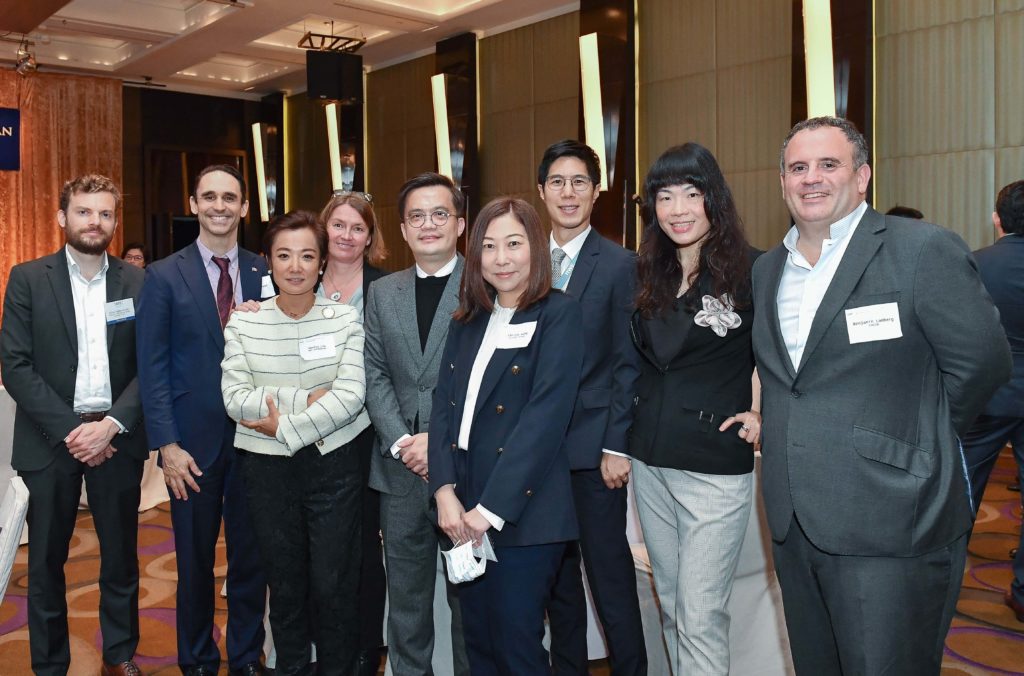
-
Our appreciation goes to the nine companies, seven from the LCI, two RE100 sponsoring the report: Ørsted沃旭能源, Crédit Agricole CIB東方匯理銀行, wpd達德能源, Taiwan Mobile台灣大哥大, PwC資誠, Hua Nan Bank 華南銀行, TCI 大江生醫, Cathay Financial Holdings國泰金控, and Grape King Bio葡萄王.
-
